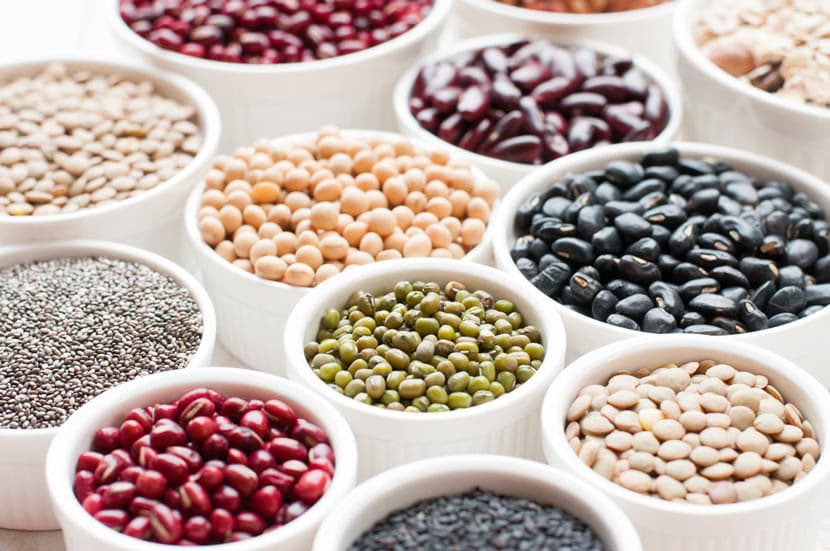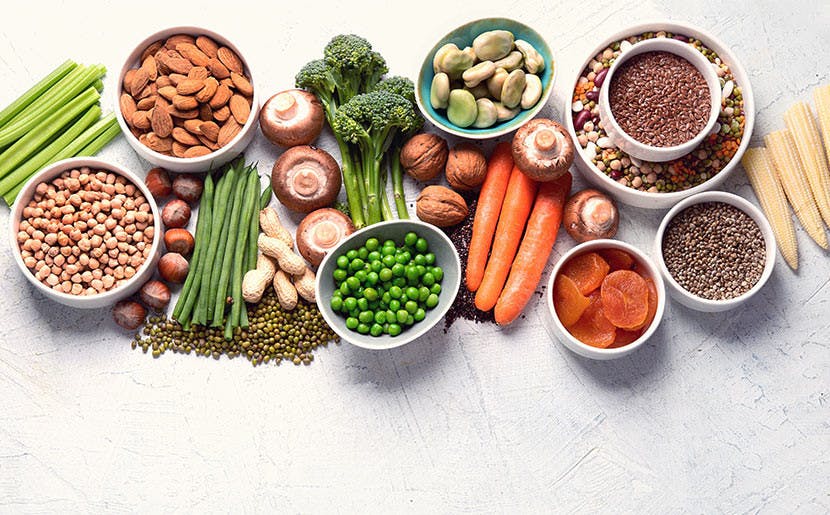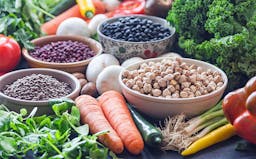Is Being Vegan Healthy?
Article by:
Professor Walter Veith, PhD |
14 min read
To most people in the industrialized world, the word vegetarian conjures up images of boring carrots and lettuce leaves, but nothing could be further from the truth. Vegetarian diets can be very satisfying indeed. But does a vegan diet supply all the necessary nutrients to be healthy?
Plant-based cultures through history
The fact is, most of humanity throughout history has subsisted on vegetarian or near-vegetarian diets. Even in this modern age, the vast majority of the people who inhabit this planet survive on a largely vegetarian diet. A prime example are the Hunza people of the Himalayas who are known for their disease-free society and longevity. The Tarahumara Indians of Mexico are also renowned for their stamina and vibrant health, yet both these tribes subsist on largely vegetarian whole-food diets.1

Vegan vegetarian lifestyles are becoming more and more popular, and many people are adopting the plant-based diet for reasons of health, religious beliefs, philosophical considerations, or environmental convictions. However, not all the vegetarian practices dictated by some of these convictions are equally beneficial, and some of them, particularly those dictated by religious or metaphysical beliefs, can place severe restrictions on the utilization of certain foods. Moreover, some groups, in addition to following restrictive diets, shun the expertise of nutritional science and the medical profession, and run the risk of suffering malnutrition and associated diseases.
Types of vegetarian diets
Vegetarians can be divided into three categories, depending on the range of foods included in the diet:
01 |
Vegan vegetarians avoid all animal products. |
02 |
Lacto vegetarians include dairy products in their diet. |
03 |
Lacto-ovo-vegetarians include dairy products and eggs in their diet. |
Dairy products should, if possible, not be included in the human diet, and the other animal products also have their health risks, particularly in view of modern husbandry practices and the rising incidence of food-borne diseases. However, a diet that excludes all animal products might seem restrictive, and indeed can be, if certain criteria are not met.
Restrictive diets and vegan deficiencies
The more restrictive the diet, the greater the chance of developing deficiencies and nutrient-deficiency related diseases. Risks will increase if single-plant food regimes are adopted such as diets consisting only of fruit or only of legumes or only of cereals. The higher diet levels of the Zen macrobiotic diet are, for example, made up entirely of cereals, and cases of scurvy, anemia, hypoproteinemia, hypocalcemia, and even death from malnutrition have resulted from this lifestyle.2
Vitamins, minerals, and protein for vegetarians
Vegan vegetarian diets must be well planned, and special attention must be given to nutrients which occur in low levels or are absent from plant foods. Moreover, pregnant or lactating women and infants and growing children also need specific dietary consideration. However, if due consideration to these points is given, a total plant-based diet can supply all our dietary needs. A variety of plant foods, incorporating grains, nuts, seeds, legumes, fruits, and vegetables, will supply ample nutrients for healthful living. Nutritionists often express skepticism as to the adequacy of a vegetarian diet, and their main concerns revolve around adequacy of proteins, calcium, iron, riboflavin, and vitamin B12.
If a combination of cereals and legumes are used, protein deficiency is extremely unlikely, and numerous studies have proven not only the adequacy, but also the superiority of plant proteins over those of animal origin.3 Indeed, the reverse is true in that it is difficult not to exceed recommended protein allowances on a varied vegetarian diet.

It is only when calorie needs are not met that the body will preferentially utilize proteins as an energy source, and this may result in deficiencies. Such conditions are mostly found in populations where malnutrition is a common phenomenon. Regarding the other nutrients listed, all these nutrient requirements can be met by plant foods, except for vitamin B12, but this can be supplied through fortified soybean milk, nutritional yeast grown on a B12 medium, or through supplementation.4 Even without supplementation, reports of vegans suffering from vitamin B12 deficiency are extremely rare.
Plant based diets are in general lower in calories than omnivorous diets, and as a result plant based vegetarians are normally slimmer than their omnivorous counterparts. It was found that vegetarians weigh eight kilograms less than meat eaters who are, on average, five to seven kilograms overweight. The lower weight of vegetarians has distinct health advantages in that slim people fall into lower risk categories regarding cardiovascular diseases and cancer. But how can a plant based diet provide all the essential nutrients for optimal health?
The plant based diet
Obviously the body requires a minimum intake of energy to stay alive, and the number of calories required varies with gender, size, and body weight. Adults require around 1000-1700 calories per day at rest (basal metabolic rate or BMR), while activity increases the energy expenditure. The average energy consumed per day is 2000 calories for women and 2700 for men, but heavy manual labor or sporting activity can increase the requirements to as much as 4000 calories per day.

The plant based diet has a lower fat and protein content and a higher carbohydrate content than most other diets, and particular attention must be paid to energy intake as the energy supply from fat is 9.4 kcal/g, whereas carbohydrates and proteins supply only 4.2 and 4.3 kcal/g respectively.
What science reveals about plant-based eating
A well-balanced plant-based diet not only provides all the necessary nutrients, but research shows that a whole food, plant-based diet is what’s best for optimal health and longevity. Here are just a few conclusions scientists have made based on their studies:
Epidemiological as well as clinical data . . . suggest that a well-balanced vegan diet can be adopted for the prevention, and in some cases, in the treatment of many diseases…. As whole plant foods are very rich in food-derived antioxidants and other phytochemicals, they have many positive physiological effects on different aspects of health.5
We found robust evidence for short- to moderate-term beneficial effects of plant-based diets versus conventional diets (duration ≤ 24 months) on weight status, energy metabolism and systemic inflammation in healthy participants, obese and type-2 diabetes patients.6
New research finds that following a diet rich in plant-based foods and low in animal products during midlife is associated with a significantly lower risk of cognitive impairment later in life.7
Greater adherence to a dietary pattern consistent with a plant-based diet was related to better performance on all cognitive tasks. . . . Furthermore, this same plant-based dietary pattern was associated with reduced baseline inflammation in a separate dataset. These results suggest that a plant-based diet relates to better cognition, especially through improved executive control.8
The need for a whole food plant based diet plan
Food guides are useful in teaching, but the average person will not pay much heed to them unless educated to do so. The vegetarian tribes of the world also do extremely well without the use of dietary charts and lists of recommended daily allowances (RDA). The diets that have been established in these tribes have, however, arisen over time and have been practiced for generations, whereas Western societies must rediscover simple wholesome eating practices. Moreover, there are so many so-called health foods and metaphysically inspired health notions that the health-food industry has become a minefield of misinformation. Under these circumstances it is prudent to make a thorough investigation of the issue, and not to avoid the voice of science.
The changing face of government recommended food plans
In general, Western societies adhere to the Basic-Four nutritional guide which correlates adequate nutrition with regular intake of the four basic food types: dairy products, breads and cereals, fruits and vegetables, and meat. It is interesting that even this Basic-Four Food Guide was found to be lacking in vitamin E, vitamin B-6, magnesium, zinc and iron.
In the past, these four food groups were considered to be of equal importance—the plate was divided into four quarters each with one of these food groups. Recently, however, this Basic-Four diet has come under attack from health circles, but intensive lobbying by the meat and dairy industry has managed to keep it at least partially afloat in the minds of the general public. In the past American school children were taught that a healthy diet included meat every day, but now the US government has recognized that a vegetarian diet can be healthy.

In 1992 the USDA issued a revised recommendation in which the “food pyramid” was used for the first time. It was suggested that grains and cereals form the bulk of the diet, vegetables and fruits were suggested as next in importance, followed by animal products and finally fats, oils, and sugars which were to be used sparingly.
The 1996 guidelines came closer to endorsing a plant-based diet, stating that “Most vegetarians eat dairy products and eggs and, as a group, these lacto-ovo-vegetarians enjoy excellent health.” The guidelines, however still warned against a strict vegan diet and supplementation of iron, zinc, and B-vitamins was suggested.
The change of heart came from an overwhelming body of evidence that the consumption of animal products is a health risk. At the time, Michael Jacobson, executive director of the “Centre for Science in the Public Interest” criticized the US government for not coming out more strongly against meat in the 1996 guidelines. Since then, more changes in lifestyle have been recommended and changes will likely continue to be made. However, critics claim the USDA recommendations are subject “to political or commercial pressures from food industry”9 and consumers would do well to keep these biases in mind.
Vegans and those on a strictly whole food plant based diet need different guidelines from those commonly accepted in Western societies, and they need to plan their eating regimes carefully. Nevertheless, a balanced whole food plant based lifestyle is not only possible, but can indeed be desirable in terms of health.
Healthy vegetarianism
Ovo-lacto- and lacto-vegetarians have less of a problem in meeting caloric needs than do those who eat only plant foods, and that is why the safety of lacto-ovo-vegetarian eating patterns is normally emphasized in dietetic recommendations, whilst specialized dietary planning is recommended for vegan type diets The energy component of ovo-lacto-vegetarian diets is boosted by the animal fats included in these diets and is therefore not to be regarded as a positive aspect of these diets.
Plant based diet meal plan basics
Those who eat only plant foods must plan diets that will compensate for the omission of dairy products, by ensuring that they include adequate quantities of high energy foods in their diets. Provided this is done, it has been shown that a vegan diet can provide all the body’s needs and can be followed without fear. A number of suggested vegan diet patterns have been analyzed, and it was found that the diet suggested by Selma Chaij-Rhys came closest to satisfying daily nutritional needs of adults. This diet uses a simple numerical formula and starts off by using grains, fruits, nuts, and vegetables, and adds vegetable-protein foods fortified with vitamin B-12, such as fortified soy milk or simply a B-12 supplement.

This eating pattern will supply more than double the RDA of iron, particularly as the high vitamin C content will enhance the utilization and absorption of non-haem iron. Riboflavin and niacin needs are also met. The pattern, however, falls short in protein and energy, particularly in men, but the use of a larger serving size would help to bridge the energy gap.
The Chaij-Rhys diet plan will supply adequate nutrition for women in all the nutrients with the exception of calories. Again, a somewhat larger serving will cater for all the needs, including energy needs.
|
Number of servings |
Food groupings |
Serving size |
1 |
Legumes, nuts, seeds, including nut butters |
½ cup legumes or 2 tablespoons nuts or seeds |
2 |
B12-fortified vegetable protein (ex. Soy milk) |
1 cup or 1 serving |
3 |
Vegetables, including green, leafy vegetables |
1 cup raw, ½ cup cooked |
4 |
Fruits (fresh, dried, or juice) |
1 fruit, ½ cup juice, or 1 tablespoon dried |
5 |
Grains and breads (whole grains) |
1 slice bread or ½ cup cooked |
Complete protein - easier than you may think
Correct food combinations are essential when trying to meet protein needs, as various plant-protein sources complement one another. Legumes are high in lysine but low in the sulphur-containing amino acids methionine and cystine, and the combination of legumes with grains, which are high in methionine and threonine and low in lysine, will provide an excellent protein. To achieve a proper amino acid balance is thus not nearly as complicated as it sounds. For example, the ordinary peanut butter sandwich will supply complete proteins as it is a combination of a grain (wheat) and a legume (peanuts).
A well-balanced whole food plant based diet plan has definite health advantages and is really not difficult to achieve.
This article is adapted from the book Diet and Health by Dr. Walter Veith, PhD. International store / Canadian store
Check out our plant-based food guide to help you plan healthy meals!
These statements have not been evaluated by the Food and Drug Administration or Health Canada. Our articles, videos and products are not intended to diagnose, treat, cure, or prevent any disease. If you are pregnant, nursing, taking medication, or have a medical condition, consult your physician before following any recommendations or using any product on our site. You assume sole responsibility for your personal health, and you must use your own discretion under doctor consultation to determine whether any product or recommendation on this site is suitable for your personal situation.








